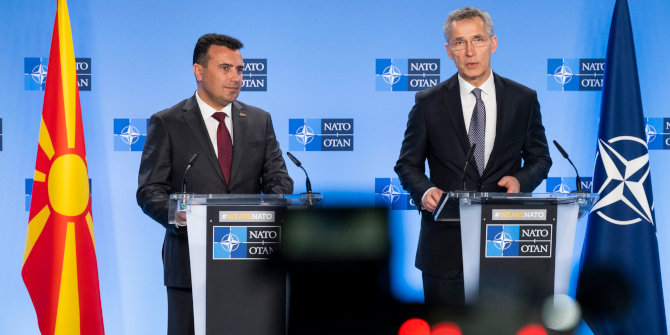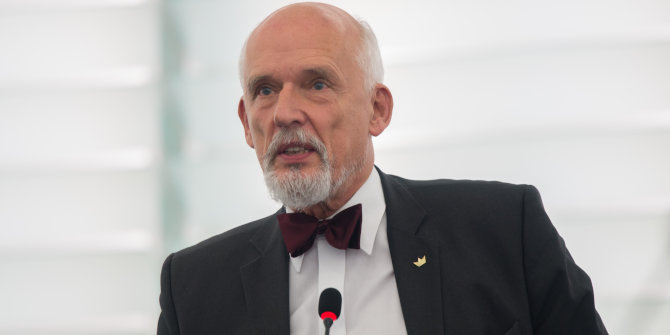 North Macedonia will hold parliamentary elections today. Alejandro Esteso Pérez explains that with tense coalition negotiations expected, the country’s progress toward European integration, the ability of the new government to restore trust in public institutions, and the fallout from the Covid-19 outbreak will all be key issues to watch following the vote.
North Macedonia will hold parliamentary elections today. Alejandro Esteso Pérez explains that with tense coalition negotiations expected, the country’s progress toward European integration, the ability of the new government to restore trust in public institutions, and the fallout from the Covid-19 outbreak will all be key issues to watch following the vote.
North Macedonia will go to the polls today. Initially planned for 12 April, the snap parliamentary elections were postponed due to the Covid-19 pandemic. Against the backdrop of the country’s highly ethnicised multi-party system, two main political groups are vying for electoral victory.
On the one hand, there is the centre-left SDSM, in power since 2017 under the leadership of Prime Minister Zoran Zaev. On the other, there is the nationalist-conservative VMRO-DPMNE, which led the government between 2006 and 2016 under the rule of Nikola Gruevski. Alongside the two main groups, the interests of North Macedonia’s Albanian community, around 25 per cent of the population, are represented by several minor parties that are attempting to take a leading position within their ethnic group.
After a decades-long record of entrenched corruption and a dramatic demographic exodus, and with a disputed European path and the novel threat of Covid-19 looming over the country’s politics, North Macedonia’s future is fragile. With all that is at stake ahead of the election, there are at least four major uncertainties that are likely to come to the fore once the results are announced.
Who will win the support of the ‘kingmaker’?
Pre-election polls are unequivocally pointing toward a highly polarised scenario where neither the SDSM nor VMRO-DPMNE will manage to garner a clear majority of votes – something that is far from rare in the country’s politics. These two organisations have traditionally relied on smaller ethnic Albanian parties as junior coalition partners in order to attain parliamentary majorities, with the Democratic Union for Integration (DUI) being the largest party of this nature. The DUI has previously backed various left-leaning and right-leaning governments over the years, profiting from its role as a kingmaker.
On this occasion, the outcome is bound to be no different. Over the last term, the SDSM and VMRO-DPMNE have developed differentiated ideological portrayals that have led to a strong domestic political polarisation, particularly at a rhetorical level. This has certainly not helped to lay the foundations for broad parliamentary consensus.
In this context, the DUI is expected to become, yet again, North Macedonia’s powerbroker. Aware of its leverage, the party has based its campaign on demanding the country’s first ethnic Albanian Prime Minister, a condition it has put forward as a prerequisite for entering a coalition with either the SDSM or VMRO-DPMNE. While this demand is unlikely to be fulfilled in reality, the expected coalition negotiations are bound to entail political concessions and controversial commitments, which will probably add up to the already tense state of affairs.
Is North Macedonia now at peace with Greece?
North Macedonia’s path toward membership of NATO and the EU has proven difficult since the country’s independence in 1991. The main obstacle to a smooth integration process has been the ‘name’ dispute with Greece, which had systematically blocked Skopje’s successive attempts for accession.
It was not until 2017 that, in an effort to overcome the Greek veto and attain a solution to the dispute, the Zaev government resumed negotiations with its counterpart in Athens, the Syriza government led by Alexis Tsipras. Several rounds of meetings ensued until a deal was reached and the so-called Prespa Agreement was ratified. Under the agreement, the ‘Former Yugoslav Republic of Macedonia’ (FYROM) would be renamed ‘North Macedonia’.
Greece subsequently pledged to drop its opposition to Skopje’s accession aspirations. This allowed North Macedonia to access NATO as its thirtieth member in March this year. Around the same time, the EU27 gave a green light to launching enlargement negotiations with Skopje, a commitment that had been pending for almost two years since the signing of the deal.

Zoran Zaev, Prime Minister of North Macedonia, with NATO Secretary General Jens Stoltenberg, Credit: NATO (CC BY-NC-ND 2.0)
At home, the road to signing the Prespa Agreement was not immune to controversy. The public was heavily divided on the issue of the country undergoing a name change in return for Greece dropping its veto. As the largest party in opposition, VMRO-DPMNE stood out as the most outspoken challenger of the deal with Athens – a position that became even more assertive following a government-promoted referendum that did not meet the participation threshold and was thus deemed illegitimate.
Two years after the deal was struck, North Macedonia’s compliance is still at stake. While the SDSM is bidding for a continuation of the Prespa framework, which has thus far allowed the country to make substantive advances toward European integration, VMRO-DPMNE embodies a revisionist view that could lead to the reconsideration or modification of the agreement. North Macedonia’s proactive European perspective could thus be in jeopardy and the country’s accession process may slow if VMRO-DPMNE obtains the upper hand in the elections.
Is the restoration of trust in public institutions possible?
The decade of Gruevski-led VMRO-DPMNE rule that preceded Zaev’s term in office was heavily stained by the perception of corruption and state capture. The public image of the judiciary, political parties and public institutions was heavily damaged and in urgent need of restoration, something that the SDSM pledged to solve when it entered into government in 2017.
In the end, however, what was perceived as a hopeful return to the rule of law in the eyes of the public ended up as a disappointing perpetuation of the status quo. The most recent example was the fall from grace of the Special Prosecution Office (SPO), an ad hoc body constituted in 2015 with the task of investigating high-level political crime and whose seeming transparency and credibility had rendered it a highly-trusted institution. Its head, Katica Janeva, was recently found guilty of the misuse of public office. Termed the ‘Extortion’ case, the scandal has shaken the country and the reputational damage stretches as far as Zaev himself.
The election results will likely reflect how poorly the public perceive Zaev to have handled corruption during his three years in office – the issue has formed one of the cornerstones of VMRO-DPMNE’s campaign against his reelection. Formerly supportive segments of the electorate now appear disenchanted by the SDSM and may well switch their vote to another party or, as will most likely be the case, join the many others who choose to abstain from voting at all – a dangerous sign of disenfranchisement from the political process.
What about Covid-19?
North Macedonia is currently facing an aggressive upsurge in Covid-19 cases. After a modest first wave was stemmed by strict lockdown measures and curfews, the country is now seeing a resurgence. The elections risk contributing to a further uptick in cases. There were sharp disagreements between the main political parties during the negotiations over the election date: while the SDSM had consistently argued for a date in June, VMRO-DPMNE considered this too dangerous and pushed for a later date. An agreement over the final July date was not reached until mid-June.
While the management of the most immediate consequences of the outbreak will likely coincide with the parties holding coalition talks, the country’s rebuilding efforts after the pandemic are set to be headed by the winning alliance. Consensus and partisan understanding will have to prevail for effective measures to be implemented safely.
Please read our comments policy before commenting.
Note: This article gives the views of the author, not the position of EUROPP – European Politics and Policy or the London School of Economics.
_________________________________
 Alejandro Esteso Pérez – Group for Legal and Political Studies
Alejandro Esteso Pérez – Group for Legal and Political Studies
Alejandro Esteso Pérez is an International Research Fellow at the Group for Legal and Political Studies in Prishtina, Kosovo. His research focuses on EU enlargement, corruption, elections and party politics in the Western Balkans.



